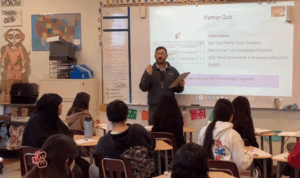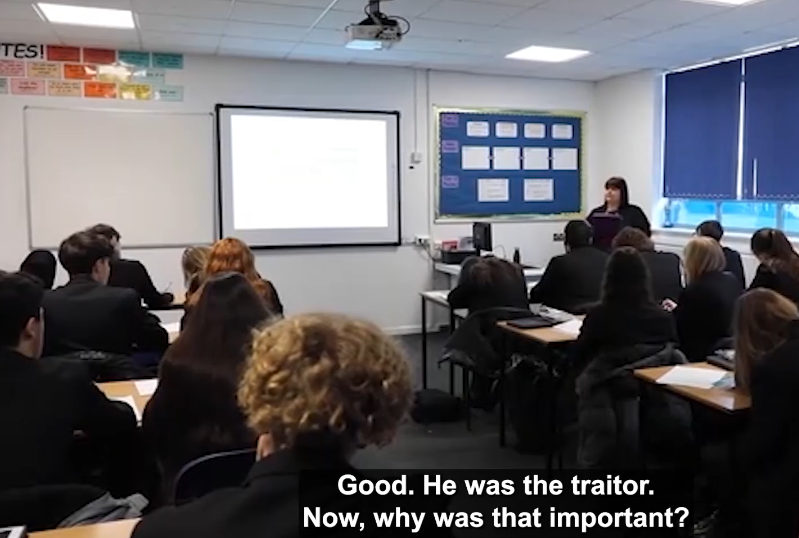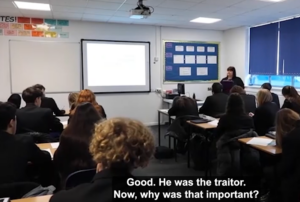
Actually, please do try this at home…
Ben Katcher was a Teach Like A Champion Fellow from 2023-24. For his final project, he focused on developing a knowledge-rich AP US History curriculum. Ben discussed knowledge organizers with Doug on the Sweat the Technique podcast (here). Sign up for his free newsletter about how to apply the science of learning in the classroom here. He can be reached at KnowledgeFirstHistory@gmail.com. He reflects here on teaching students to be more effective in using retrieval practice to review for exams.
In my AP US History class, it’s vital that my students develop study skills that can help them learn and use a lot of content knowledge. Research tells us that most people (including adults!) are not very good at studying, spending too much time reviewing information and too little time retrieving information. Information becomes far more durable and better encoded in our long-term memory when we are quizzed on it, or when we quiz ourselves on it. With this in mind, partner quizzing has become an important system for retrieval practice in my classroom.
Partner quizzing can be a powerful way to help students speak and listen to each other, develop their ideas, and prepare to participate in whole-group discussions or construct thoughtful ideas in writing. But partner work can suffer from some common pitfalls, including:
- One partner dominating the discussion
- Students struggling to identify the resources they need to participate fully
- The teacher struggling to monitor multiple, simultaneous conversations, leaving misconceptions unaddressed
I am excited to share one activity I use in my classroom that maximizes the benefits and minimizes the risks of partner work.
This activity is a partner Retrieval Practice drill. I use this activity toward the end of a unit of study, before students take a quiz on key terms and dates associated with that unit. The goals of this activity are to help students encode knowledge, practice effective study techniques in advance of the quiz, and self-assess their understanding.
To prepare for the activity in the video below, I took all of the key terms and dates from my Unit 8 Knowledge Organizer and turned them into question form, placing a checkbox next to each question (see a portion of both my Unit 8 Knowledge Organizer and partner quiz below).
As you can see in the video, I begin the activity by reviewing the expectations. I instruct Partner #1 to ask Partner #2 each retrieval practice question. I instruct Partner #2 to attempt to answer each question without their knowledge organizer. If Partner #2 is able to answer the question, then Partner #1 will place a check next to the term on the handout that belongs to Partner #2. If Partner #2 is unable to answer the question, then they are expected to look at their Knowledge Organizer and read the answer. In that case, Partner #1 will not place a check next to the term.
As students begin asking and answering the questions, I circulate throughout the class with a copy of the student handout on my clipboard. As I circulate, I listen to student conversations, but this only gets me a limited amount of information. I only have the opportunity to hear each student ask and answer 1-2 questions. Therefore, my main focus is looking at the students’ handouts to note which terms have check marks next to them, indicating that they have been answered correctly. I then tally the terms that do not have check marks. By the end of the seven minutes, I have reliable, student-generated data that indicates the most common gaps in knowledge.
After seven minutes, the timer goes off, indicating that it is time for students’ to switch roles. But before we do that, I take the opportunity to review common misconceptions. During this lesson, my formative assessment data indicated that common misconceptions included the Truman Doctrine and the Military-Industrial Complex, so I reviewed these terms with all students.
By the end of the activity, students have generated for themselves a personalized study guide that indicates which terms they know well and which terms they need to study in more depth before the assessment. I instruct students to focus their study time on the terms that their partner did not check off for them. And I instruct them to study in exactly the way they did in class; ask themselves the questions and see if they can answer without the Knowledge Organizer. If they can, then check off the answer for themselves.
Through this activity, my students have practiced a more effective study method than simply rereading information and prepared to study effectively on their own.



